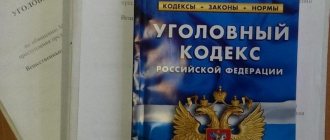Theft is a criminal act in almost every jurisdiction. In Russia, criminal and administrative liability for this crime is provided for in Article 158 of the Criminal Code of the Russian Federation “Theft”, as well as Article 7.27 of the Code of Administrative Offenses of the Russian Federation “Petty Theft”, respectively. The age of liability for theft of property is 14 years.
Theft can involve any form of property. An important aspect is that the stolen property - a thing or object that has material or spiritual values, as well as money and securities - are strangers to the thief.
From a legal point of view, theft differs from other types of theft: robbery, robbery, fraud or embezzlement. The key difference between these compounds is the estimated amount of damage caused, which determines what kind of liability - administrative or criminal - the person punished will bear. How many thousand rubles is a person liable for?
Minimum amount of theft for criminal liability
The amount of 2,500 rubles is the minimum amount for criminal liability; this is where prosecution begins under the Criminal Code of the Russian Federation. Anything less is according to the Code of Administrative Offenses (however, certain conditions must still be met, namely, there must be no aggravating features, the presence of which will always result in criminal liability, no matter how much was stolen - 100 rubles or a million. We talk about these important features closer to end of the article).
For an individual person who committed theft, in accordance with Part 1 of Art. 158 of the Criminal Code of the Russian Federation provides for the following preventive measures:
- a fine of up to 80,000 rubles or an amount equal to the amount of wages (other income) of the person punishable for up to 6 months is imposed;
- performing mandatory work for up to 360 hours;
- attendance at correctional labor for up to 1 year;
- temporary restriction of freedom for up to 2 years;
- attending forced labor for up to 2 years;
- administrative arrest for up to 4 months;
- imprisonment for up to 2 years.
From our separate publications you can find out how theft differs from robbery, as well as what is the difference in classifying this type of crime from robbery and robbery.
Special rules for fraud
The Criminal Code of the Russian Federation contains special rules for establishing the amount of damage caused for certain elements of fraud provided for in Articles 159 (parts 5 to 7), 159.1, 159.3, 159.5, 159.6.
The article was approved by practicing lawyer, blog expert, Christina Shekina
In relation to these compounds, the amount of damage and the rules for calculating it differ from the general procedure described earlier. For these crimes, a significant amount of damage is estimated by criminal law at an amount of 10 thousand rubles, large - from 3 million rubles, especially large - from 12 million rubles.
Such a significant amount of damage is established by the legislator for initiating a criminal case due to the fact that the parties to the relationship are business entities (individual entrepreneurs or organizations).
All property and material assets of the enterprise are subject to reflection in accounting documents. If any things, objects, products or raw materials are not capitalized and registered, it will be almost impossible to prove their theft (for example, if an organization hides property or understates production volumes to reduce taxes).
It must be taken into account that for almost any property produced or acquired by an enterprise, the initial cost indicators are lost over time. This is due to its use, resulting in natural physical wear and tear. Depreciation indicators are recorded annually in accounting information and will be taken into account when calculating damage from theft.
Simple theft of less than 1000 rubles
Simple theft or petty theft - when the value of the stolen property does not exceed 1000 rubles, and there are no crime factors provided for in Parts 1-4 of Article 158 of the Criminal Code of the Russian Federation.
According to Part 1 of Art. 7.27 of the Code of Administrative Offenses of the Russian Federation imposes the following responsibility:
- an administrative fine is imposed in the amount of 1,000 rubles to five times the value of the stolen property;
- administrative arrest for up to 15 days;
- compulsory work for up to 50 hours.
What does the legislation say?
Petty theft is one of the most common crimes. Such violations occur almost every day. For the most part, violations of this type are recorded in large supermarkets, in special self-service stores, as well as in shopping centers.
According to modern legislation, recorded theft of up to 1,000 rubles is a special violation of an exclusively administrative nature and is characterized as a case of petty theft.
Such an offense is regulated by the requirements of the Code of the Russian Federation on offenses committed. One rather important nuance is noted, which gives this kind of violation the character of a real criminal act.
This rule says that the fraudster must have time to use the stolen property before the violation is discovered. In other words, the criminal act must be considered completely completed.
If a thief has committed a standard theft - stealing a product from a store and managed to consume it, a violation of the law may be considered committed.
If the products were confiscated by security guards, a person can and has the right to evade responsibility.
In sizes from 1000 to 2500
In the case where the value of the stolen property is from 1000 to 2500 rubles and there are no crime factors provided for in Parts 1-4 of Art. 158 of the Criminal Code of the Russian Federation. According to Part 2 of Article 7.27 of the Code of Administrative Offenses of the Russian Federation, the following liability is imposed:
- an administrative fine ranging from 3,000 rubles to five times the value of the stolen property is imposed;
- administrative arrest for a period of 10 to 15 days;
- compulsory work for up to 120 hours.
Changes for convicts serving prison sentences
At the moment there is decriminalization. It represents the transfer of minor criminal offenses to the category of administrative offenses. Art. 10 of the Criminal Code of the Russian Federation establishes the fact that a law mitigating or exonerating liability has retroactive force. For this reason, convicted persons have the right to draw up petitions with a request to release them and mitigate their responsibility.
The completed petition is sent to the judicial authority at the address of the location of the correctional institution - pre-trial detention center, penal colony, penitentiary institution, penitentiary institution. Authorized persons do not have the right to prevent the submission of an application.
From 5000 to 250,000
In case of significant material damage in the amount of 5,000 to 250,000 rubles or the theft occurred under the following circumstances:
- the crime involved a group of persons who acted by prior conspiracy;
- there was unauthorized entry into the premises or storage;
- significant damage was caused to other persons;
- property was stolen from clothing or a bag that was in the victim's possession.
Liability, according to Part 2 of Article 158 of the Criminal Code of the Russian Federation, provides for the following possible penalties:
- a fine in the amount of up to 200,000 rubles or the collection of an amount equal to the amount of wages (other income) punishable for a term of up to 18 months;
- performing mandatory work for up to 480 hours;
- attendance at correctional labor for up to 2 years;
- assignment of forced labor for a period of up to 5 years and temporary restriction of freedom or without it for a period of up to 1 year;
- imprisonment for up to 5 years and temporary restriction of freedom or without it for up to 1 year.
Establishing the amount of damage in conditions of changing exchange rates
The Plenum Resolution entitled “On judicial practice in cases of theft, robbery and robbery” contains the rules. Authorized persons use them to calculate the amount of damage.
- To establish the amount of theft, the actual value of the property on the date of the crime is used.
- If information about the value at the time of the crime could not be found, you need to seek help from experts. Specialists draw up acts on the basis of which the value of the property is then established.
- The damage that must be compensated is determined in accordance with the value of the property on the date of the decision on compensation and compensation. It is possible to index the value of property on the date of execution of the decision.
- Separate rules are provided for objects of special socio-cultural value. In order to correctly establish their value, it is necessary to invite experts who will draw up an act and write down in it the monetary value of a particular object and its significance for society, the cultural and scientific sphere of life.
- If controversial or conflict situations arise, you will need to seek help from an independent expert. However, choosing the person responsible for paying for his services is a separate issue.
If the theft involved foreign currency, then the amount of damage is calculated at the Central Bank exchange rate at the time the crime was committed.
The law also defines moral damage, which resulted in suffering, loss of ability to work, humiliation, and stress for the victim. It is calculated in monetary terms on an individual basis by the court. To compensate for moral damage, the victim must have documentary evidence on hand.
From 250,000 to 1,000,000
Grand theft in the amount of 250,000 to 1,000,000 rubles or committed under the following circumstances:
- there has been unauthorized entry into the premises or storage;
- theft was carried out from an oil, gas or petroleum product pipeline;
- the theft was committed on a large scale;
- theft from a bank account (unless the crime is proven on the grounds provided for in Article 159.3 of the Criminal Code of the Russian Federation).
Responsibility, according to Part 3 of Art. 158 of the Criminal Code of the Russian Federation provides for the following possible penalties:
- imposing a fine in the amount of 100,000 to 500,000 rubles or collecting an amount equal to the amount of wages (other income) punishable for a period of 1 to 3 years;
- attendance at forced labor for up to 5 years and temporary restriction of freedom or without it for up to 1.5 years;
- imprisonment for a term of up to 6 years, payment of a fine or without it in the amount of up to 80,000 rubles or collection of an amount equal to the amount of wages (other income) punishable for a term of up to 6 months, restriction of freedom or without it for a period of up to 1.5 years.
Example from judicial practice No. 1
Previously convicted citizen N., unemployed, abusing alcoholic beverages, committed open theft of someone else's property.
Having seen a large bright package in the supermarket, the attacker brought it closer to the exit. Seizing the moment when the guard switched his attention, the intruder took the package out of the store.
The security guard reacted in time and detained the criminal on the street, after which he called the police.
Initially, based on witness testimony and other circumstances of the case, the unlawful act was classified as robbery.
However, during the judicial investigation, the classification of the offense was changed to attempted robbery, and the attacker was charged with responsibility for an unfinished crime. This was done as a result of assessing the contents of a stolen package, which contained a children's insulated blanket worth 700 rubles.
The culprit confirmed that he had no intention of stealing the blanket. He was mistaken in thinking that the package contained something more valuable.
At the same time, since citizen N. had previously committed similar acts, the change in the crime did not lead to significant improvements in the situation of the convicted person: he was imprisoned for a period of 1 year and 6 months.
More than 1,000,000 rubles
Theft committed on an especially large scale in the amount of 1,000,000 rubles or more or was committed under the following circumstances:
- carried out by a pre-organized group;
- fact of theft on a large scale.
Liability, in accordance with Part 4 of Article 158 of the Criminal Code of the Russian Federation, provides for the following possible penalties: imprisonment for a term of up to 10 years, the imposition of a fine or without it in the amount of up to 1,000,000 rubles or the collection of an amount equal to the salary (other income) of the person punishable for a term up to 5 years, temporary restriction of freedom or without it for up to 2 years.
We talk in more detail about the criminal liability provided for by the Criminal Code of the Russian Federation for theft in a separate article.
Example from judicial practice No. 2
Brothers M.V. and I.V., having entered the farm at night, tied up the watchman and slaughtered the bull. Having cut the carcass into pieces, the attackers took it with them. In the morning, farm workers freed the bound guard.
The watchman said that he did not resist because the criminals had an ax and a knife. Although the culprits were exposed quickly enough, they continued to deny their guilt. As a result, they admitted to their crime and explained that they committed the crime due to unemployment and difficult financial situation. Regarding the ax and knife, the brothers explained that they intended to use these tools for slaughtering a steer, and not as weapons.
The court considered their arguments justified, and therefore they were prosecuted for robbery, not banditry. The punishment was 2 years in prison.
As evidenced by extensive practice, robberies have a number of common features: a selfish motive, impudence, and sometimes aggressiveness.
Attempted crime
As mentioned above, the standard Administrative Code covers theft that was not recorded until the violator left the scene of the violation.
If a person immediately returns something stolen or taken through carelessness or misunderstanding, the act will be defined as attempted theft.
In such a situation, the violator can get away with a simple apology and, accordingly, will not be held accountable. An option is also being considered when the thief reimburses the amount of stolen products on the spot. The issue of proof of shoplifting should only be resolved in the presence of the police. To open a case, a search must be carried out, and security guards do not have the legal right to do this.
Security company employees and private individuals can only detain a possible intruder in the premises and wait for the police to arrive.
However, even police officers can conduct a search on special grounds:
- CCTV footage.
- Testimony of witnesses.
If the fact of petty theft is proven, no one has the right to demand reimbursement of payment. Such compensation is carried out exclusively by court decision. If police officers do not comply with this rule, they can be sued under the article “Extortion.”










